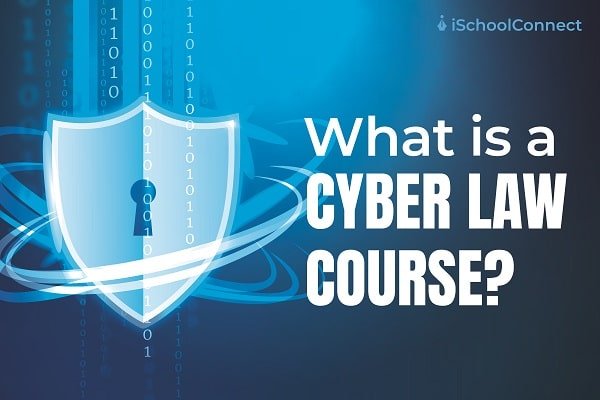Table of Contents
Cyber Law courses have a lot of potential due to the scarcity of specialists in this industry. As technology is constantly changing, it is critical to provide a safe and secure environment for those using cyber platforms.
Complex operations such as digital signatures, certification, electronic transactions, and other significant online procedures require the guidance and surveillance of a cyber law professional.
More Cyber Lawyers are needed to safeguard people, businesses, and government organizations against cybercrime. If you are thinking about doing a Cyber Law course, keep scrolling to know about the top courses and other details!
Types of Cyber Law courses
You need to know the types of Cyber Law courses available before choosing one. So, here’s a list for you!
Integrated courses
At the undergraduate level, several universities offer integrated courses with a duration of 5 years. It might be a BBA, BA, BSc, or BCom + LLB combination. A B.Tech + LLB program is also offered, but it will take six years to complete.
If you have a B.Com + LLB degree, you can opt for corporate law, whereas if you have a B.Tech and LLB degree, you are equipped with the required technical knowledge in the cyber law field.
Postgraduate degree
You can apply for a postgraduate degree if you have completed your undergraduate degree and now want to pursue a career in cyber law. You can also pursue a PG degree if you have completed your law degree and want to pursue a specialty in cyber law. Such specialties are expected to open up more opportunities for career growth.
Cyber Law certificate course
The certificate courses in Cyber Law are available in both online and offline modes. In most cases, there is no age restriction while you study the online courses on Cyber Law, and the courses allow you to study at your own pace.
However, you need to complete higher secondary (10+2) to pursue an offline Cyber Law course. Anyone who wants to improve their abilities without quitting their existing employment or school course can enroll in Cyber Law certificate programs.
Postgraduate Diploma
After finishing your undergraduate degree, you can pursue a postgraduate diploma, such as a PG Diploma in Cyber Security or Cyber Law. The duration of this course is 1 year.
Secondary education
Completing your bachelor’s degree is the first step to becoming a Cyber Lawyer or launching a career in any sector. To begin the process, fill out forms for admission to the legal institution of your preference.
CLAT, AILET, and ULSAT are some of the entrance exams that you can go for. If you want to study abroad, then you can take the LSAT and LNAT exams.
Cyber Law course- Eligibility

The eligibility criteria for a Cyber Law course differ from one college to the other. If you have finished your higher secondary (10+2) or equivalent from a recognized board, you can apply for an integrated Cyber Law course offered at the university. On the other hand, to opt for a master’s course, you must have an LLB or equivalent degree.
The job profiles
Here are some of the job profiles that you can take up after pursuing the Cyber Law course-
- Cyber Lawyer
- Cyber Consultant
- Research Assistant
- Legal Advisor
Cyber Law course- Skills required
You may achieve new heights if you are willing to enhance your skillset in the field. Some of the abilities required for a profession in Cyber Law are listed here-
- Critical thinking
- Research skills
- Communication skills
- Ability to work under pressure
- Observational skills
- Technical skills
- Analytical skills
How to apply for a cyber crime law course?
The bachelor’s and master’s courses in cybercrime may require you to pass an entrance exam.
You can apply for an online course directly through the cyber law school’s website. Admissions to offline courses are based on grades from the 12th grade.

The way ahead
Whether it’s a government or commercial enterprise, each organization is engaging a Cyber Lawyer to get specialized legal counseling and guidance.
The cyber law course scope includes having the option of working in-
- A courtroom or a law business
- An IT business
- At a bank
- A police agency as an ethical hacker, or any other job profile that matches your skillset.
If you don’t wish to start a career right away, then you can continue with your education, leading to more growth opportunities. If you believe you haven’t learned enough but don’t want to pursue a PG diploma or graduate degree, a certificate course on Cyber Law is an option.
Key takeaways
- The boom in technology has resulted in many cybercrimes, which has brought Cyber Law into the picture.
- Now, to implement cyber laws the industry needs professionals with the required skillset. As a result, various Cyber Law courses have come up to bridge this gap.
- If you are willing to pursue a Cyber Law course, know about the types of courses and the eligibility before taking up a course.
- The career prospects are amazing after this course as every industry is being digitized and they need Cyber Law professionals to simplify those processes.
Now that you know about the Cyber Law courses, pick the one that interests you the most and aligns with your goals. If you have any questions/suggestions, then reach out to us or drop a comment below.
Liked this blog? Read next: Career options after 12th science | 10 best ones to choose!
FAQs
Q1. What are the courses offered in Cyber Law specialization?
Answer – The courses offered in Cyber Law specialization include certificate, postgraduate, cyber law diploma courses, etc.
Q2. What is the duration of the cyber law diploma?
Answer – The duration of the Cyber Law diploma is 6 months to 1 year.
Q3. What are the top 5 cybercrimes?
Answer – The top 5 cybercrimes include-
- Online Harassment
- Invasion of privacy
- Cyberstalking
- Phishing scams
- Identity Theft scams






